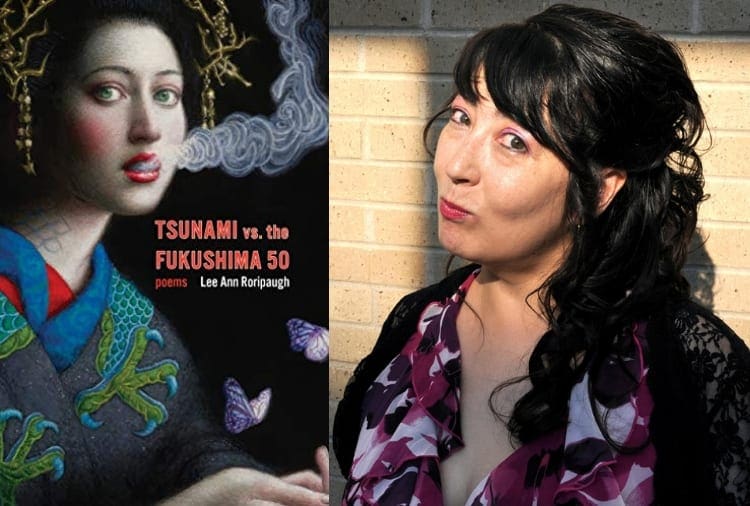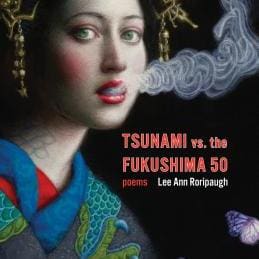
The collection pulls you into moments in history with rhythm and eloquence.
Lee Ann Roripaugh’s Tsunami vs. the Fukushima 50 doesn’t mess around. It comes straight at you with mesmerizing authority. This collection, based on the 2011 tsunami and resulting nuclear accident in northeastern Japan, is dazzling, and we can’t get enough of it.
While it has definite layers, this is the type of poetry collection you might give to a friend who doesn’t usually read poetry. Like the natural disaster it portrays, the book has a powerful immediacy. It contains serious subject matter, but it’s also genuinely fun. Many of Roripaugh’s poems—with their short, crisp lines and occasional rhymes—could be described as “catchy.” They often make use of specialized and pop-culture vocabulary. This gives them the feeling of having been put together from scavenged parts, as with the use of tech and internet words in “ontology of tsunami”:
call her the meme
infecting your screen
call her the malware
gone viral
Tsunami vs. the Fukushima 50 is, among other things, an exploration of nature and the feminine. It looks at how nature and women are both seen as a societal threat, and how both are therefore measured and observed. We love how “beautiful tsunami” repurposes popular representations of femininity:
with her Hello Kitty barrettes
pink glitter ribbons furbelowing
all that snaky girlzilla hair
Roripaugh’s book, which is dedicated to those affected by the disaster, also explores grief and loss. Some poems take on voices of those who have lost loved ones. These pieces have a darker tone, but are still often fused with larger-than-life references. For example, one poem showing the sadness and rage of a man grieving for his wife and daughter is titled “hulk smash.” While this might seem emotionally confusing at first, it helps to create new psychic space. Human beings often struggle to deal with tragedy on a large scale, especially if we think that we might in some way be responsible. We can become numb to it, or doubt our right to feel anything if we weren’t directly involved. At the same time, many of us are emotionally attached to consumerism and pop culture to a degree we aren’t even comfortable admitting. When Roripaugh blends these two elements, she offers us a way into feeling something for a collective loss.
The collection ends with “origami of tsunami: a technical manual and glossary,” which is an alphabetical list of terms and their “definitions.” This final poem continues to riff on popular and consumerist language, but this time in an educational format. For instance, “icg/itsu: (international coordination group for the tsunami warning system in the pacific)” is “defined” as “tsunami’s HMO sans Aflac.” Lines like this may make us laugh at first, and then feel something deeper. Like the rest of Tsunami vs. the Fukushima 50, they give us a way to edge closer to concepts that might otherwise be overwhelming. Roripaugh’s poems are at times devastating, but also hopeful and satisfying.
Feature Photo from Milkweed.org.
















